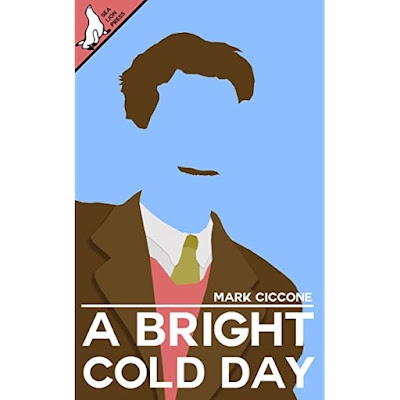Matthew Kresal reviews a recent alternate history release from Sea Lion Press.
George Orwell.
There are few authors whose name can immediately evoke a mood and tone. As the pen name of Eric Arthur Blair, Orwell does so even 70 years after his death, with the haunting portraits of totalitarianism he painted with words in Animal Farm and Nineteen Eighty-Four. The journey that led Blair to write those novels, and the most famous dystopia of them all, started not in the early years of the Cold War or even during the Second World War. Instead, the Spanish Civil War in the 1930s started the author down, as David Aaronovitch called it in the superb eponymous 2013 BBC Radio 4 documentary, the road to Nineteen Eighty-Four. The conflict and how it might have unfolded very differently both for Blair and on the whole is the subject of Mark Ciccone's new novel A Bright, Cold Day from Sea Lion Press.
As a publisher dedicated to alternate history (including, full disclosure, my novel Our Man on the Hill, which Alexander Wallace and I discussed recently on Author Talk), Sea Lion offers a perfect home for Ciccone's novel. A Bright, Cold Day rests on not one but two points of divergence from our history. The first is that Blair/Orwell, serving in the POUM, one of the militia groups fighting on the side of the Spanish Republic, escapes a grave neck wound and stays to fight in the conflict longer than he did. The other departure, and the one with broader implications, sees the Spanish Civil War become the lightning rod that touches off an earlier Second World War as Nazi Germany openly enters the struggle and the Soviet Union steps up its support of the Republic. Ciccone handles both divergences early in the narrative, the novel making its singular shift from Orwell to take readers across the front and later Europe to illustrate the second change. It's a brief but jarring shift in narrative focus but a comparative blip on the radar.
Because the story Ciccone tells is very much that of Blair/Orwell. What if his time in Spain didn't present him with, as David Aaronovitch put in that documentary, a political utopia never to be seen again but something far darker. Bright, Cold Day follows the author through a war that steadily becomes a meatgrinder, and then, as time goes on, the cause he's fighting for shifts due to the political dictates of Moscow. It's a journey that takes Blair/Orwell, and eventually the world at large, down a different path, one that readers of his most famous work might begin to recognize.
Despite a hefty mix of elements, Ciccone crafts a brisk narrative. At roughly 200 pages, the novel moves along at a pace, making it easy to read large portions of it in a sitting. Being part war novel, the skirmishes Blair/Orwell finds himself in are well-presented but hardly in heroic terms. Where A Bright, Cold Day comes into its own is capturing the author, not unlike Winston Smith in Nineteen Eighty-Four, navigating a world of changing allegiances and politics, culminating in the haunting final act of the narrative. It also helps that Ciccone knows his Orwell, with readers familiar with Orwell's Homage to Catalonia (his account of his time in Spain) and his more famous works picking up on several homages and things given new life in this alternate history. There are also a pair of cameos where the writer encounters two of his fellow novelists, both in Spain in real-life, that will serve as icing on the cake for those familiar with their work and the influence one of them had on Orwell's writing.
All of which leaves A Bright, Cold Day as a solid read. One that fans of Orwell and historical fiction, whether or not they're familiar with alternate history at large, should read and enjoy. If only for a vision of how the life of one of the last century's great novelists could have unfolded and a nightmare vision of the future may have begun to pass.
Matthew Kresal is a writer, critic, and podcaster with many and varying interests. His prose includes the non-fiction The Silver Archive: Dark Skies from Obverse Books, the Cold War alternate history spy thriller Our Man on the Hill, and the Sidewise Award winning short story Moonshot in Sea Lion Press' Alternate Australias anthology. You can read more of his writing at his blog and at The Terrible Zodin fanzine, or follow him on Twitter @KresalWrites. He was born, raised, and lives in North Alabama where he never developed a southern accent.
Post Top Ad
Subscribe to:
Post Comments (Atom)


























No comments:
Post a Comment